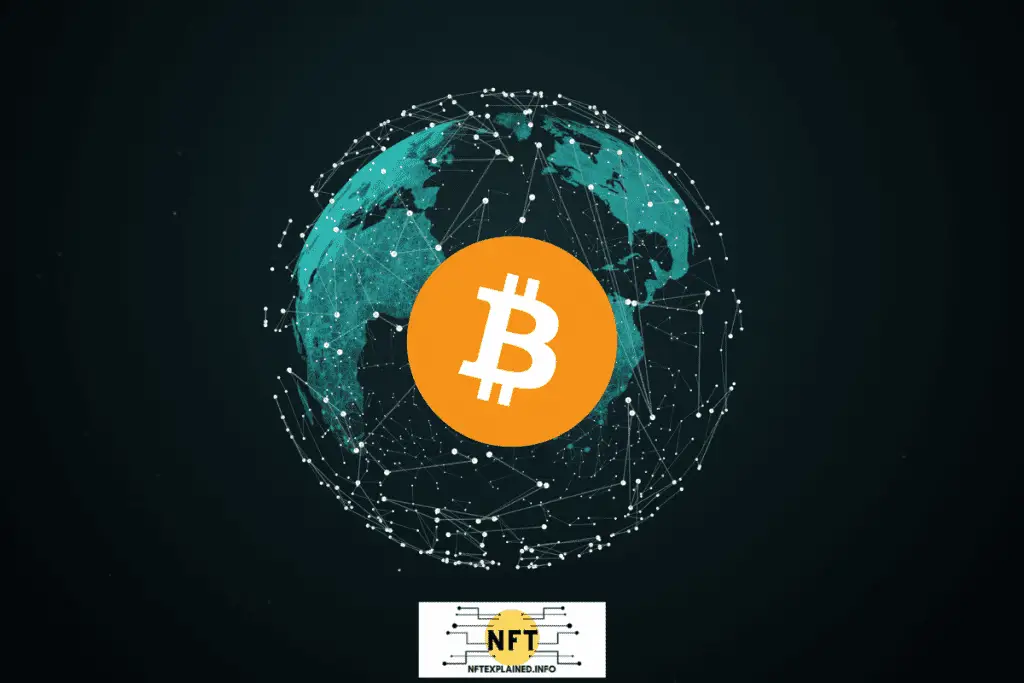
A common buzz word in the digital asset space is “decentralization”. Often a praised aspect of cryptocurrency, those newer to the space are often left wondering: what is it, and why is it important? The team of researchers here at NFTexplained.info are here to answer all the questions surrounding decentralization (with regards to crypto, NFTs, and smart contracts).
Decentralization is when there is no central, governing entity in control or making the decisions. In the context of cryptocurrencies, this is the transfer of control/ownership to computers worldwide in order to hold up the network and allow anyone to transact without an intermediary.
Blockchain technology is essentially a distributed ledger, meaning that everyone has access to the record of transactions. The records of the transactions are immutable, meaning the record cannot be altered without changing the cryptographic hashes (which would require approval from the majority of the network – making the blockchain safe).
Decentralization enables a more efficient network with an array of benefits. Since Bitcoin was the first widely adopted digital currency created that didn’t rely on any government, decentralization has been a key foundation of cryptocurrency.
Why Are Cryptocurrencies Decentralized?
Decentralization allows networks to operate on their own, without central government control. Many have asked why a few individuals or entities have the right to make decisions on behalf of everyone else; this begs the question, why are cryptocurrencies decentralized?
Cryptocurrencies are decentralized in order to remove the need for a central authority to verify transactions. This removes intermediaries when transacting and allows cryptocurrencies, which are essentially held up by a network of computers, to be more secure (as no single person has authority over the network).
Decentralization also reduces corruption due to anonymity and eliminates the need for intermediaries.
For example, if you were in a place with significant discrimination and were unable to secure a loan – because of your gender, religion, or ethnicity – you would unfortunately have few options.
Through decentralization, no single entity would have the authority to decide who gets a loan and who doesn’t. A loan applicant with crypto (i.e. VeChain or Solana) as collateral will experience a different outcome – many crypto loan sites allow anyone with suitable collateral to acquire a loan.
Decentralization also benefits and protects the “small guy” in business. If you had a small farm selling corn that wasn’t profitable due to massive corporations unwilling to transport your corn without massive fees, you would be out of work. In a decentralized world, there would be no middle man or intermediary imposing high fees and you could sell your corn directly to your buyer. This is one glimpse into the decentralized aspect of NFTs – artists are able to create digital art and sell it directly to buyers.
Another aspect of decentralization also confers the benefits of anonymity, which, in some cases, is critical to the creation of digital art or NFTs (especially NFTs that may portray governments in a negative light). Artwork which highlights the corruption of government officials may be illegal in certain countries; but, with a decentralized platform – like the blockchain – these creators are able to sell their work directly to a buyer without being tracked down and punished by government entities.
Now that our team has provided some insight as to the benefits of decentralization, let’s take a look at the technology which makes decentralization possible.
How Are Cryptocurrencies Decentralized?
The blockchain is essentially a distributed ledger, meaning that everyone has access to the record of transactions. The records of the transactions are immutable, meaning the record cannot be altered; altering transactions would require the network’s approval.
Cryptocurrencies are decentralized via the underlying technology they’re built on – blockchain technology. This allows for a peer-to-peer network; this is possible as computers from all over the world are able to run a consensus mechanism which approves or denies transactions without any central authority.
On a peer to peer network, every individual is treated exactly the same. The immutability aspect of blockchain technology eliminates the need for trust. With smart contracts, trade executions or transactions are completed automatically if requirements by the buyer and seller are met (without anyone’s approval). This translates to no middleman and often eliminates fees altogether.
Our team will provide an analogy as a way to think about centralized vs decentralized (& smart contract) transactions.
Let’s say you are looking to purchase Coinbase stock. In order for the transaction to go through a number of centralized authorities need to approve this action. The bank must approve the removal of funds from your bank account. The brokerage in which you are purchasing the stock needs to approve/verify the buying and selling of the stock. This often incurs fees, and in some cases – for example the aviation industry – exceptionally high fees.
With smart contracts, the execution of purchasing anything (i.e. some amount of a cryptocurrency) will be executed purely based on code – and again only if the buyer and seller’s requirements are met. Instead of requiring the actions of two people, the transaction occurs directly.
While decentralization and smart contracts provide clear benefits such as the removal of fees, much faster transactions, and the ability to transact without the approval of centralized governments or large corporations – there are downsides (as with most everything). One potential downside is that these transactions are executed once the code is written and the requirements are met – even if the person changes their mind and no longer wants the transaction to occur.
Many would agree that there are clear issues with centralized finance with a particular pain point being the high fees associated with simply using your money. Some examples are the 3% charged for each credit card swipe, ridiculously high cross border payment fees, and interbank transfers often being very expensive.
Cryptocurrencies are secured by cryptography – a highly secure technology which makes the execution of transactions, including smart contract transactions safe.
What Is The Most Decentralized Cryptocurrency?
With decentralization being one of the main distinguishers between crypto and fiat (a currency backed by a country/government) as well as one of the main attractions to investors in this space, let’s take a look at the cryptocurrency that is considered to be the most decentralized.
Bitcoin is considered to be the most decentralized cryptocurrency because it has the largest number of nodes – computers that are connected to this specific blockchain’s network. The large network size makes it essentially impossible for any entity to take control over the network.
One reason Bitcoin is considered to be the most decentralized is because of the amount of people running the Bitcoin software – and from all over the world. Technically speaking, anyone with the necessary computer (i.e. a strong CPU or GPU) is able to mine or verify transactions in the proof of work (PoW) consensus mechanism that Bitcoin exercises. If you are considering mining cryptocurrencies on a typical Windows or Apple laptop, read more on that here.
Transactions which occur on the Bitcoin network are verified by miners or those running the Bitcoin software; those with the most powerful GPUs are often the first to verify the transaction and are therefore rewarded (with $BTC) in the PoW system. Those who do not verify the transaction first still consume energy in the attempt, yet do not receive the reward. This energy intensive process is one of the main arguments against Bitcoin but more specifically the PoW system. More on the PoW and its alternative PoS (proof of stake) can be found here.
To conclude our article, our team will wrap up by answering a question we frequently get on social media.
What Does Centralization And Decentralization Mean In Cryptocurrencies?
Centralized currencies like the US dollar are controlled by a centralized authority (in this case, the Federal Reserve System) while cryptocurrencies like Bitcoin are controlled by distributed peer-to-peer systems (widely dispersed computers) that run Bitcoin’s core software.
A major difference between the two is that the centralized authority – the Federal Reserve for the U.S. dollar – can influence the amount of dollars created or printed while Bitcoins mining system is set in stone (occurring no matter what – and cutting down miners rewards approximately every four years).
More on Bitcoins’ halving can be found in this easy to explain breakdown by our team where we also talk about the effect it has on price – we will link that here.
Please follow us on all our socials and let us know what cryptocurrency you think is most decentralized. Find us on Instagram, Twitter & TikTok! As well as subscribe to our YouTube!

